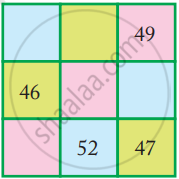Advertisements
Advertisements
प्रश्न
If N ÷ 5 leaves remainder 3 and N ÷ 2 leaves remainder 0, then N ÷ 10 leaves remainder 4.
पर्याय
True
False
उत्तर
This statement is False.
Explanation:
Here it’s given N ÷ 5 leaves remainder 3
⇒ N = 5n + 3,where n = 0, 1, 2, 3, ...
And N ÷ 2 leaves remainder 0
⇒ N is an even number
But N = 5n + 3, it’s sum of two terms whose second term is odd.
Therefore, 5n should be an odd number.
5n can be odd when n = 1, 3, 5, ...
So, in this case when N = 5n + 3
⇒ N = 5(1) + 3 = 8 when (n = 1)
Hence when we substitute n = 1, 3, 5, ... in N = 5n + 3, we get 8, 18, 28 etc
Now, when we divide N by 10, N can be written as
N = 10 × n + 8, when n = 0, 1, 2, 3, ...
Therefore, when N ÷ 10, always leaves remainder 8.
APPEARS IN
संबंधित प्रश्न
Given an example of a number which is divisible by both 4 and 8 but not by 32.
Which of the following statement is true?
If a number is divisible by 4, it must be divisible by 8.
Which of the following statement is true?
A number is divisible by 18, if it is divisible by both 3 and 6.
Do you remember magic triangles? Come now, let s make some magic squares.
- Fill this square using all the numbers from 46 to 54.
Rule: The total of each line is 150.
Now you try and change these numbers into special numbers —
28
If 5A × A = 399, then the value of A is ______.
If  then B = ______.
then B = ______.
A four-digit number abcd is divisible by 11, if d + b = ______ or _____.
A number is divisible by 11 if the differences between the sum of digits at its odd places and that of digits at the even places is either 0 or divisible by ______.
A five-digit number AABAA is divisible by 33. Write all the numbers of this form.
